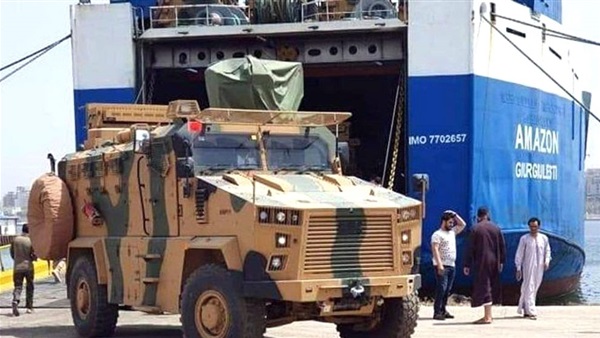Cargo ship loaded with Turkish military vehicles arrives in Tripoli

A coalition of forces allied with Libya’s
UN-recognized Government of National Accord (GNA), some of which face UN
sanctions, received a shipment of Turkish armored vehicles and arms on
Saturday. The shipment arrived amid the GNA’s efforts to stop the Libyan
National Army (LNA), led by Khalifa Haftar, from advancing toward the capital,
Tripoli.
Pictures and videos posted by the coalition on its
Facebook pages showed what appeared to be dozens of Turkish-made BMC Kirpi
armored vehicles in Tripoli port.
“The GNA is fostering its forces defending Tripoli
with armored vehicles, ammunition, and quality weapons,” the pro-GNA coalition
said on one of its Facebook pages, without giving further details about the
origin of the military equipment.
The cargo ship “Amazon,” flying a Moldovan flag,
publicly unloaded its cargo midday on Saturday at one of the wharfs of the
Tripoli seaport. The vessel had sailed from the northern Black Sea port of
Samsun, Turkey.
Its cargo included a shipment of around 40 armored
vehicles of Turkish origin that came from northern Turkey. These were met at
the port by forces loyal to Salah Badi, leader of the powerful al-Samoud
militia, which has in the past opposed the GNA and any political solution in
Libya. Badi was added to a UN sanctions blacklist last November.
Later on Saturday, there were also reports and
pictures posted on the Facebook page of another radical Tripoli militia – the
Marsa Brigade – of machine guns, sniper rifles, and anti-tank and aircraft
missiles, freshly wrapped in crates, with the suggestion that these had also
formed part of the Turkish cargo and had been distributed to frontline militia
fighters defending Tripoli.
Meanwhile, a Turkish drone was reportedly shot down
by the LNA last week, leading to warnings from the national army’s leadership
that Turkey was sending weapons to Libya.
The UN has been monitoring for an uptick in Turkish
military support for Tripoli militias ever since the GNA’s Interior Minister
Fathi Bashagha, who founded the Marsa Brigade, made a lengthy visit to Ankara
earlier this month.
Bashagha, who is increasingly being seen by GNA
insiders as the real power in Tripoli rather than Prime Minister Fayez
al-Serraj, is from Misrata – a Libyan city with strong historical links to
Turkey.
Earlier this month, a Tripoli government spokesman
said his administration was talking to its ally Turkey to obtain “anything that
is needed to stop the assault,” including military and civilian help.
“If correct, this is extremely concerning as it
could lead to an escalation of violence and more civilian casualties,” one UN
source said.
However, a Libyan media activist based in Turkey who
posted pictures of the cargo arriving explained that the move was justified in
order for the GNA to “defend themselves against the attack.”
Asked if Bashagha had arranged for the shipment of
military equipment, he replied, “Fathi Bashagha has responsibility, but there
are other people unknown to the world who are also on the ground.”
The armored vehicles – which are according to
experts the BMC Kirpi vehicles or “Hedgehogs” used by the Turkish army – were
publicly offloaded in a show of defiance by forces loyal to Badi and displayed
on the Facebook page of al-Samoud.
Experts said that defensive military equipment like
the armored vehicles could theoretically be allowed into Libya without
breaching UN sanctions, but that this would be unlikely given hostilities.
Badi himself was hit by the UN with a travel ban and
asset freeze for his role in stirring up violence in Tripoli. The capital was
gripped by violence throughout last summer as extremist militias challenged the
GNA’s authority.
A statement posted by the British Foreign Office
detailing the reasons for his sanctioning said, “Salah Badi… has worked
consistently to undermine a political solution in Libya. In August and
September 2018, Badi played a leading role in heavy clashes in Tripoli in which
at least 120 people were killed, most of whom were civilians.”
Instability in Tripoli and the role of militias
backed by Turkey and other countries is one of the reasons put forward by
Haftar for trying to take over Tripoli, according to the LNA spokesman.
Links between the militias in Tripoli to more
extremist Islamic groups, such as the outlawed terrorist group Ansar al-Sharia
as well as al-Qaeda and ISIS, have also become increasingly apparent in recent
weeks.
This week saw the fourth attack by ISIS against the
rear guard of LNA forces in the south of Libya, in what US intelligence
assessments have suggested might be a coordinated military tactic to hamper the
LNA’s bid to take Tripoli, and therefore the whole country.
There have also been numerous reports of extremist
fighters joining the effort in Tripoli against Haftar, with some returning from
Syria as battle-hardened extremists as a result of the bloody conflict, in
which Turkey has been closely involved.
Yesterday, there were also rumors that Zeyad Balaem,
one of the leaders of Ansar al-Sharia and the Benghazi Shura Council, which
Haftar has battled for the past three years, was injured in fighting for the
GNA, or at least against Haftar.
Diplomatic sources briefed on the talks with Ankara
had previously said that Turkey was being “sensitive” to NATO and US-leadership
opinion against sending weapons to Libya, which remains under a UN arms
embargo, and was using the opportunity to seek economic concessions.
Last night, however, a senior Western diplomatic
source said it does not appear as if Turkey is at all concerned with “upping
the ante and their position with the Americans.”
Haftar is visiting European capitals this week,
drumming up support for his battle for Tripoli. Now, according to a Libyan
diplomat with knowledge of discussions between Haftar and the White House, he
may be invited to Washington DC, which has publicly shown support for him but
has yet to step in militarily in Libya.





